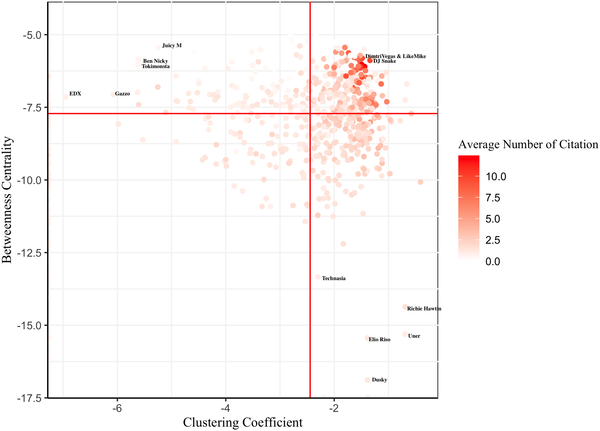Professor Wonjae Lee and Dr. Hyeongseok Wi from the Graduate School of Culture Technology analyzed the playlist data of producers in the electronic dance music (EDM) industry to uncover the factors that lead to musical success. The research team collected data from DJs who participated in nine major EDM festivals held around the world from 2013 to 2016 to form a citation network. They concluded that distinct musical identity and social position were key to acquiring acknowledgement for a production.

The value of musical products is difficult to evaluate due to the inevitable subjectivity that comes into play during assessment. It often happens that the quality and success is anticipated through the reputation of the creator. Professor Lee and Dr. Wi looked to establish a relationship between the musical and the social aspects by creating a set of quantifiable criteria. Musical identity was calculated based on track information including genre, key, and tempo. The ratio of a particular track data value to the total number of composed tracks collected from an individual DJ represented the consistency in the music produced, and thus represented how focused their musical identity is. Quantification of social connections was made possible using the collaborative nature of EDM — DJs showcase their style by utilizing tracks from other producers and remixing them. The number of citations received was used to gauge the social network of a particular DJ. According to the researchers, as an “emerging niche market that is constantly developing and differentiating new styles and genres”, the artists involved in the EDM market “establish the value criteria and demarcate the categorical space into separate identity positions”. The artists who were most unique and experimental with their music, along with taking on a hybrid position between brokerage and cohesion in their social relations had more access to new resources and were therefore most successful.
Professor Lee and Dr. Wi’s study was published on August 25 in PLOS ONE under the title, “Stars inside have reached outside: The effects of electronic dance music DJ’s social standing and musical identity on track success.” It is expected that the findings of this study may also be applied to the markets of other musical genres, as well as other domains of creative work.

